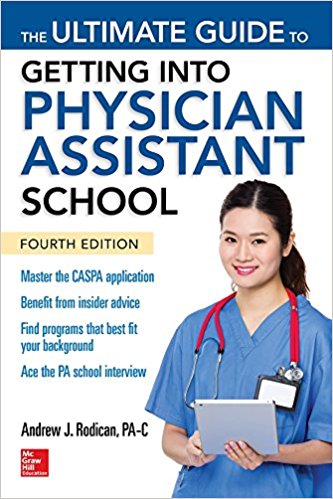
Everybody's journey to becoming a PA is a bit different.
We all have different lives, different upbringings, different barriers to overcome to reach our goals. We have different paths that have led us to want to become a physician assistant.
No single formula will assure you a golden ticket to PA school (I am sorry to say). But I can tell you this: Like many things in life there are ways to increase your odds.
Most of them you already know, but you may have forgotten.
'A successful person does what a failure does not like to do.' - My DadClick To TweetStep 1: Start Working Hard, Most Likely for Free!
One of the single most important things you can do is start working hard, and yes that will most likely be for free.
The single most important thing I did was to work and volunteer in hospitals and clinics throughout my Pre-PA life.
When I was in college, I walked into the campus health center and asked if they needed help. I began volunteering, which led to a job in medical records which led to a position working in the campus lab which resulted in me being trained as a phlebotomist.
I was making a whopping $4.25 an hour, and this was in 1997. But the takeaway is this: I met every single Doctor, PA, Nurse, MA, NP, Midwife in the entire clinic and many throughout the hospital.
It was never about the money. It was about making meaningful connections. These connections served me well and became the single most important reason I did get into PA school. The letters of recommendation from my closest mentors were the reason I landed my first PA school interview and is the main reason I get to do what I do today.
Get out there and find something good to do.
"Make your application shine. We want to see all of the great things you have done in your life as a student and individual. We like to see people dedicated to learning, hardworking and with a strong sense of empathy." - Professor Petersson PA-C, Case Western Reserve University
Start for free if you need to. It could be volunteering, candy striping, visiting the cancer wards, transferring patients within the hospital, helping out at blood drives, etc., etc., etc.
Volunteer Match is a great resource to find volunteer opportunities in your area.
Look what Charlie Hoehn says about the value of free work and how to be a recession proof graduate in this Ted Talk. It's good advice for life and for the path to PA school.
Step 2: Be Passionate and CARE!
This goes back to step one.
If you are going to volunteer, don't just show up and wait for somebody to tell you what to do. Make volunteering your work and do it with pride. Show up every day on time, with a smile and be fully present. Make it your job to bring more passion to this than anyone else.
You don't follow your passion you always bring it with youClick To TweetI had my first "real" job at the age of 16 at Burger King.
I was trained by a gentleman who, despite low pay and reduced benefits, was passionate about his job. After six weeks I could make a darn fine Whopper. The management took notice, and I was quickly promoted. Unlike many of my colleagues I cared about the customer experience, and when I showed up, I made it a point to be fully present and always cheerful.
Always care about your client's experience, even in the seemingly simple things. You will leave a trail of good deeds, hard work, and positive emotions. This will pay many future dividends.
Step 3: Go Beyond the Minimum Requirements
There is a minimum of prerequisites you need to get into PA school. Make it your goal to exceed these minimums.
Like many PAs, before I learned about the profession I was actually on a pre-med track. I wasn't doing all that well mind you, but I was working my behind off. Luckily, a benefit of this was that I had already met many of the prerequisites I needed for PA school.
When I knew my junior year that I wanted to be a PA I was so happy I had put in all that hard work. Yes, I could have simply stopped the process and taken easier classes that would have met my prerequisites, but I didn't. I continued to take challenging classes that pushed me to my limits.
Years later, my wife is also very happy!
This accomplished two things
- It set me apart from many of the other applicants (although many had done the same).
- It prepared me for the rigors of PA school.
Make it a point to go beyond the minimum
The Adcoms want to see your application match what you have actually done. Nothing bothers me more than someone who talks for pages about how much they want to work with underserved individuals, but has not volunteered a day in their life, or who wants to be a great leader but has never led anything. The best CASPA applicants are those whose applications align with a school’s goals and have the experience to back it up. That will top GPA any day. - PA School Administrator
Don't focus so much on grades and getting a 4.0.
I am proud to say I had a 2.9 by the time I applied to PA school. I had a trail of extremely challenging coursework that I still carry with me today. Am I an epic failure because I didn't have a 3.9 or a 4.0? No! And when I sat in front of my future instructors in PA school and told them about why I wanted to be a physician assistant, I did it with pride. Because I knew that I had challenged myself and that I was prepared for anything they could throw at me.
And you know what? That holds true to this day.
Step 4: Just Apply! And Cut Out the BS
I attended the University of Medicine and Dentistry of New Jersey. I applied to four PA Schools and the last was UMDNJ. I wasn't going to apply because I failed to meet the minimum requirement of a 3.0 GPA (as noted above). I was going to throw the application in the garbage when my Mom of all people stopped me and said: "It never hurts to apply". And boy was she right.
And why was it this application that got accepted? Because I cut out the BS!
In my previous applications, I feared failure so much that I let it guide my writing on the application. My essays were routine and uninteresting. But for UMDNJ, because I figured I had no chance whatsoever, I threw caution to the wind. I wrote from my heart and used my authentic voice which was rooted deeply in:
- Hard Work
- Passion
- Caring
- A willingness to go beyond the minimum
I will write more about this in the future. But the point is: Don't over-analyze, start thinking outside the box, work extremely hard for what you want and don't follow the herd!
P.S I actually did read this book prior to applying for PA School.
You can sign up to receive updates via RSS or Twitter or join me on Facebook















Does a mixture of online and standard university classes make the cut, or do they prefer physical classes?